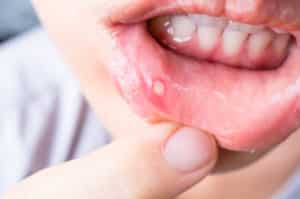What to do When Canker Sores Strike


Canker sores can be really irritating, especially when they cause each bite of food to be painful. How do they come about in the first place? Injuries, how you brush your teeth, healing dental work and even stress are some common factors for you getting canker sores. Here’s how they happen, what they are, and what to do when they strike!
Canker Sores 101
One of the most common mouth sores is a canker sore. These come in various sizes and colors, and they can be quite bothersome for many patients. Some patients will luckily have very small canker mouth sores that go away quickly. However, other patients will have canker sores that grow to the size of dimes and are extremely painful. More than 3 million people a year in the U.S. get canker sores. Most are between 1/3rd of an inch to ½ of an inch in diameter in the mouth. Those sores will line the inside of the cheeks on any of the soft tissues behind the lips, on the gums and even the tongue. Common causes of canker sores include:
- Injury to the soft tissues of the mouth.
- Vigorous tooth brushing that irritates gum tissue.
- Braces or dentures that scrape or catch.
- Acidic foods and drinks.
- Medications and antibiotics.
- Healing dental work.
- Recent illness or other infection.
- Sports accidents that have caused injury to the mouth.

Salt Water Rinses: How They Help
Have you ever had dental work and been told to do a “salt-water rinse” afterwards to speed up healing? This is a common practice if you’ve had your wisdom teeth out or had any soft-tissue work done on your mouth. Salt is a naturally-occurring mineral that has been found to be successful in treating soft-tissue injuries in the body.
In fact, studies have shown that people have been using salt solutions for centuries to heal from injuries, sores and infections. This is because salt is naturally an “isotonic solution”. This means, it’s a solution that works well with the body because it’s made up of minerals, just like the body. Other rinses such as mouthwash are made up of natural ingredients as well as chemicals, which can irritate damaged soft tissues of the mouth.
To do a salt water rinse, you warm a cup of water and dissolve an ample amount of salt into the solution until it is very salty. Then you take turns swishing the solution in your mouth for 20-30 seconds at a time. The more you do this, the quicker your mouth sores can heal, because the salt helps accelerate the healing your tissues do. Salt also diminishes how acidic your mouth is, which reduces bacteria and your risk for tooth decay. You can take the sting away from mouth sores within the first day for some canker sores and speed up your recovery.

What If It’s Not a Canker Sore?
Studies show that most canker sores should clear up within a few days up to 2 weeks. If you have a sore that has lasted longer than 2 weeks, definitely schedule an examination with your dentist. Canker sores are generally circular and can appear white, but that doesn’t always mean your particular mouth sore is a canker.
If your sore doesn’t go away, it’s not a cause for alarm. Simply have a dental exam to see what is going on. You can get sores from infections or oral issues such as:
- Tooth decay (dental caries)
- Gum disease
- Gingivitis
- Hand, foot, and mouth disease
- Herpangina
- Cold sores (oral herpes)
- Oral cancer
However, you can also get canker sores in various sizes and shapes through the common causes we’ve mentioned. The only way to be sure is to have your dental examination in-office. No matter what type of sore you get or the cause, you can help reduce your risk for getting sores through:
- Having good oral health. Frequent, daily brushing and flossing will reduce mouth bacteria that can lead to infections and sores. Make sure you’re visiting your dentist often for exams and use products such as mouthwash to reduce the mouth bacteria you have.
- Investing in a good diet. Nutrient deficiencies such as folate, B12 and iron can cause mouth sores. Use a vitamin supplement if you’re not getting enough nutrition throughout your day.
- Reducing the amount of stress you have. Studies show that stress levels contribute to many of our patients developing canker sores. This is likely an immune response to help combat stress levels. Take note of when you’re getting canker sores and if stress is a trigger. Also, make sure to have de-stressing activities throughout your day to keep your mouth healthy.

Dental Help for Canker Sores
Salt water rinses will always help heal dental injuries and mouth sores in general. However, depending on what type of mouth sore you have, you may not be seeing the results you would like. No one wants to have sores in their mouth for weeks at a time if rinses aren’t helping. Our prescribed medications, pastes and dental-grade rinses can diminish the pain you feel from soft tissue sores in the mouth and will help them fade faster.
If you find yourself frequently getting canker sores, consult our office. Some sores manifest as signs of infections or even oral cancer, so you always want to keep an eye on any mouth sore you notice, especially ones that don’t go away. If you have canker sores that won’t go away or happen to frequently, call Dr. Ania’s office at 303-443-0998!


